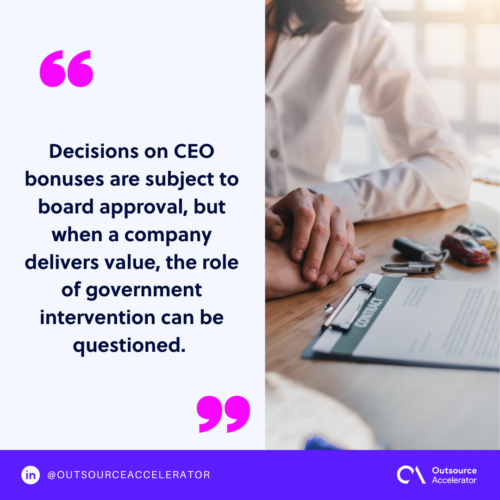Under pressure
Is the government overreaching into our lives and businesses?
With increased globalization, people are realizing that they can choose their government and the rules under which they play. These days citizens are voting with their feet.
It’s becoming a common story, Amazon was blocked by the EU from attempting to buy iRobot (iRobot did pocket a $94m deal termination fee, albeit at a cost of 31% of its workforce), the Figma sale to Adobe was blocked, and Elon Musk similarly had his Tesla bonus payment blocked by the court of Delaware.
The example of Elon
Elon Musk (love him or hate him) recently had his fantastical $55bn payout blocked by the business court of Delaware – no less than six years after it was awarded.
Decisions on CEO bonuses are subject to board approval, but when a company delivers value, the role of government intervention can be questioned.

If Musk seeks substantial compensation with board support, Tesla’s public status demands accountability; shareholders have ways to express disagreement, and the business courts have a duty to act upon such grievances.
Sending the wrong message
This all creates an ominous portent for small business owners and entrepreneurs.
Do nothing and get left alone; do well, and the government will eventually come for its pound of flesh, or at the very least, stop you enjoying the fruits of your labor.
For a business world that applauds risk-taking and innovation, this is totally the wrong message to promote.
Success should be rewarded. We want the next generation of entrepreneurs to see that taking extreme risks pays off, otherwise what’s the point?
Upping sticks
So how should companies react when the government torpedoes their business arrangement?
Find a new government.
Musk’s counter to this heavy-handed decision was to relocate to Nevada.
A little extreme, but it demonstrates how Delaware has overlooked one critical change in today’s modern business landscape – companies can move much more easily these days.
If Nevada doesn’t tick all the boxes, what about Singapore? Or Barbados (obviously ignoring the FTX debacle).
Advantage, business
The advances made in globalization since Delaware planted its flag in the sand for the corporation in 1899 mean that companies are tied less and less to a physical location for their headquarters.
Everything can be handled remotely, and practically everything can be outsourced.
From design to production to marketing, to the management and setup of the company itself, the ‘born global’ corporation of today no longer requires a brick-and-mortar location.
But of course, Tesla needs its Gigafactories, I hear you say. Yes, factories are needed, but they don’t necessarily have to be owned by the core Telsa entity. Apple, the world’s biggest company, does not own its China-based factories, and Nvidia, the 6th biggest company in the world, does not own any chip manufacturers.
Move fast and change things
Ultimately, companies should have the autonomy to decide their own fate in most cases.
Things might go wrong, sure. But the market will correct those mistakes.
Government interference isn’t leveling the field – it’s telling companies that they shouldn’t try playing in the first place.
Once a location such as Delaware ceases to be ‘business friendly’, other places and territories will gladly step up to the plate.
Delaware may well find this out the hard way.

Question for your business…
On balance, do you feel the government helps or hinders your business?

 Independent
Independent





















